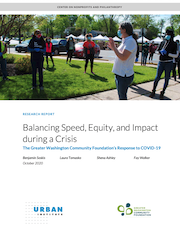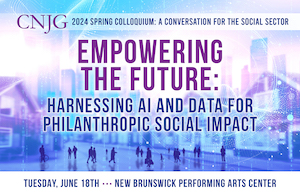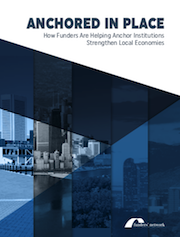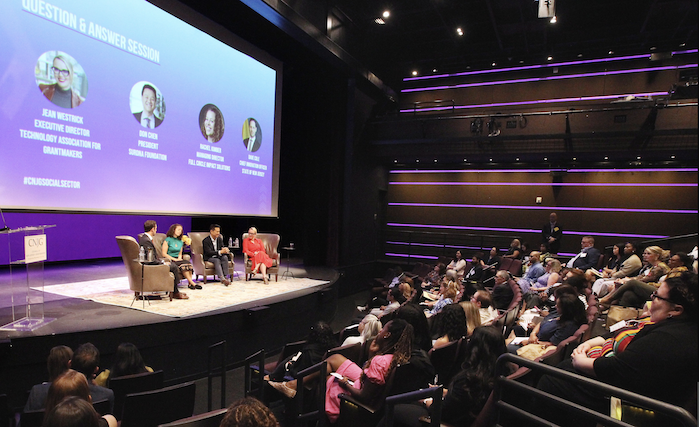Site Search
- resource provided by the Forum Network Knowledgebase.
Search Tip: Search with " " to find exact matches.
African Americans make up just 14% of New Jersey’s population, but they account for 21.3% of COVID-19 deaths, according to state fatality figures. This disparity is due to a number of factors which existed long before the coronavirus pandemic hit our state and our country. Discrimination in our health systems directly contributes to disproportionate rates of chronic disease and barriers to accessing health care for Black individuals. This web briefing will explore how philanthropy and our partners can help turn the tide and begin to address these complicated issues head on. Going back to normal is not good enough. The philanthropic community is in a unique position to bring these kinds of conversations to the forefront of our work.
Hear Dr. Denise Rodgers, Vice Chancellor of Interprofessional Programs at Rutgers Biomedical and Health Sciences, discuss the social determinants underlaying long-standing racial health disparities, and how New Jersey can address health inequity during the COVID-19 pandemic.
We’ll also be joined by Bob Atkins, Director of the New Jersey Health Initiatives of the Robert Wood Johnson Foundation, who will share his perspective on how funders can help support better outcomes for Black individuals and communities during this pandemic. To end our session, he will facilitate a conversation for grantmakers to share how their organizations are addressing racial inequity amid the COVID-19 crisis.
Join us to explore how philanthropy can help reduce the disproportionate impact of COVID-19 on Black communities in New Jersey.
Cost: Free for CNJG Members and NonMember Grantmakers
This program is only open to staff and trustees from grantmaking organizations.
Webinar Video
More than 20 years ago, the Garden State’s philanthropic community began meeting informally to discuss issues of importance to grantmakers. In the late 1980s, fueled by the observation that philanthropy is more effective when grantmakers have a forum to communicate, exchange information, and take part in continuing education, CNJG was born.
By 1998, CNJG was an independent 501(c)(3) organization with a full-time executive director and approximately 80 members. In the years since, membership has grown to include more than 130 foundations, corporate giving programs, government and other public grantmaking organizations. Informal gatherings of likeminded individuals and organizations have been replaced by robust, highly valued seminars, convenings, workshops and conferences.
Extending Philanthropy's Contribution
Over the years, CNJG also actively engaged in a number of landmark initiatives including commissioning the first study of giving in the Garden State, NJ Gives, the first study of nonprofit health insurance provider conversions to for profit corporations, New Jersey Together (a major funder collaborative centered on youth development), a landmark effort looking at the systemic, long term fiscal challenges facing all levels of government in New Jersey entitled Facing Our Future, the creation of the Community Foundation of South Jersey, and creation of the Newark Philanthropic Liaison position within our state’s largest city administration.
View our CNJG Through the Years pictorial.
Join funders for a discussion on the New Jersey Pandemic Relief Fund.
First Lady Tammy Murphy launched the New Jersey Pandemic Relief Fund (NJPRF), hosted by the Community Foundation of New Jersey, to fight against the ongoing pandemic by directing funds to local organizations providing “on the ground” services to our state’s most vulnerable populations.
On this webinar, we will hear from Executive Director of NJPRF, Josh Weinreich and President of the Community Foundation of New Jersey, Hans Dekker. Together, they will discuss how funds are being collected and distributed, how NJPRF will help fill gaps in services across the state, and the importance of coordinated efforts between government and the private sector.
The various funds being set up by New Jersey foundations and philanthropic leaders can help ensure funding is directed to areas of greatest need, encourage greater collaboration among grantmaking, nonprofit, and government partners, and create a stronger, more resilient state. Register now to hear about how the New Jersey Pandemic Relief Fund is providing essential support for our communities.
Cost: Free for CNJG Members and Nonmember Grantmakers
This program is open to Grantmakers only.
Webinar Video
Learn how your grantmaking organization can support local news that serves New Jersey communities by providing trusted information, while promoting equity and justice.
Local news plays a critical role in providing residents with reliable, high-quality, and accessible local news to stay informed about policy changes and other community responses, how to stay safe and get help, and share their concerns and needs. As we continue to face COVID-19 during an election year, it is more important than ever that we support local news that centers the concerns, voices, and information needs of residents.
During this briefing we’ll discuss COVID-19’s impact on the local news and information ecosystem and how media collaborations are filling COVID-19 information gaps in U.S. cities, including New Jersey. We’ll also explore how investments in journalism, including supporting BIPOC media, helps ensure more voices are heard and advances a more just and equitable democracy.
Join us for an engaging conversation on the importance of local journalism in building connected, informed, and engaged communities during times of crisis.
Cost: Free for CNJG Grantmakers. $50 for Nonmember Grantmakers
Webinar Video
CNJG is pleased to offer the 2024 Virtual Budget and Tax Briefing Series, hosted by our partners at Economic Opportunity Funders, to our members.
This year presents opportunities to get ready for transitions both politically and with the expiration of the Tax Cuts and Jobs Act (TCJA) in 2025. Learn more about key battles and opportunities and what’s at stake and in play in 2024 and beyond.
Part 1 (35 minutes): Noted tax and budget policy expert Sharon Parrott will provide an overview of the key provisions in the federal budget, discuss current and upcoming budget and tax debates, and offer insights on the potential impact on struggling families, workers, and communities.
Sharon Parrott, President, Center on Budget and Policy Priorities
Part 2 (55 minutes): A panel of experts will share how funders and the field are working together to build long-term power and achieve a racially and economically just tax system.
Amy Matsui, Director of Income Security and Senior Counsel, National Women’s Law Center (invited, pending confirmation)
Sarah Pray, Executive Director, Better Taxes for a Better America
Amber Wallin, Senior Policy and Outreach Director, State Revenue Alliance
Cost: Free for CNJG Grantmakers and Non Member Grantmakers.
Note: This program is for funders and philanthropic advisors whose primary activity is grantmaking.
This program will be livestreamed via YouTube, starting at 10:55 am. Registrants will receive a link to the livestream prior to the program. Please register by noon on March 18 to receive the link. If you cannot watch during this time, you can use the same link to access the recording on YouTube.
For questions, please contact Chanika Svetvilas, Manager of Programs and Learning.
CNJG is pleased to offer the 2024 Virtual Budget and Tax Briefing Series, hosted by our partners at Economic Opportunity Funders, to our members.
Learn about key trends, battles and opportunities, and what’s at stake and in play in 2024. Panelists will share insights on the recent historic state tax credit expansions, consequential state races and ballot initiatives, and efforts to support the equitable implementation of federal investments, including the Infrastructure Investment and Jobs Act, the Creating Helpful Incentives to Produce Semiconductors (CHIPS) and Science Act, and the Inflation Reduction Act.
Kamolika Das, Associate Director, Local Taxes, Institute on Taxation and Economic Policy
Chris Melody Fields Figuredo, Executive Director, Ballot Initiative Strategy Center
Justin Maxson, Executive Director, BuildUS (invited, pending confirmation)
Cost: Free for CNJG Grantmakers and Non Member Grantmakers.
Note: This program is for funders and philanthropic advisors whose primary activity is grantmaking.
This program will be livestreamed via YouTube, starting at 1:40 pm. Registrants will receive a link to the livestream prior to the program. Please register by noon on March 18 to receive the link. If you cannot watch during this time, you can use the same link to access the recording and watch at a later time.
For questions, please contact Chanika Svetvilas, Manager of Programs and Learning.

The COVID-19 public health and economic crisis has changed our world as we know it. As employers moved to remote work, schools shifted to distance learning, and businesses closed completely, it became clear that the impact on residents, nonprofits, and businesses was far greater than anyone could have ever imagined.
In response to the growing and evolving needs of our region, the Greater Washington Community Foundation established the COVID-19 Emergency Response Fund to raise and rapidly deploy funding to local nonprofits providing food, shelter, educational supports, and other critical services.
From the beginning our goal was clear: to address the immediate needs and reach adversely affected communities, particularly low-income households and communities of color. We know all too well that in a crisis like this, these marginalized communities are hit the hardest, and often take the longest to recover.
In times of crises, The Community Foundation is our region’s philanthropic first responder, bringing together individuals and families, philanthropic peers, corporate partners, and local government advisors to address community issues. Building on our rich history of emergency response work, we grounded our COVID-19 response efforts in a similar coordinated approach.
This report chronicles the steps taken, under immense pressure, to develop a coordinated emergency response effort to support a broad range of needs across the region. Once again this effort has demonstrated that working in partnership and close collaboration with our philanthropic peers and local government advisors is an effective way to manage a response to both urgent and longer-term needs.
The Council of New Jersey Grantmakers’ offers listserve services as a benefit of CNJG membership.
CNJG’s listserves facilitate ongoing group e-mail discussions among subscribed members. Members can share information and expertise, ask questions, and gather opinions of colleagues across the network. Listserves also enable members to get the most up-to-date information on related programs being offered throughout the field.
CNJG initially assigns new members to relevant listserves based on your submitted member profile. Contact Craig Weinrich to join any other listserve that interests you. You can unsubscribe from a listserve at any time by using the link found at the bottom of each email sent via the listserve.
In May 2024, our listserve provider updated its email engine, and now the automatic de-duping feature is no longer available, so sending an email to more than one listserve results in multiple emails to the recipient.
If you send an email to a listserve, and it bounces back to you, you are not on that listserve. Please contact Craig to add you to that listserve.
The listserves available are:
Camden Funders - [email protected]
Bergen Funders - [email protected]
Community Foundation CEO’s - [email protected]
CNJG Member CEO's - [email protected]
CNJG Member CFO’s and Finance Managers - [email protected]
CNJG Member Communications Staff - [email protected]
Corporate Funders - [email protected]
COVID-19 Funders - [email protected]
Culture Funders - [email protected]
Disaster Response Funders - [email protected]
Education Funders - [email protected]
Emerging Leaders in Philanthropy - [email protected]
Environmental Funders - [email protected]
Family Funders - [email protected]
Food Funders - [email protected]
Health Funders - [email protected]
Monmouth & Ocean Roundtable of Funders - [email protected]
Newark Funders - [email protected]
New Jersey Census Funders - [email protected]
Paterson Funders - [email protected]
Racial Equity Funders - [email protected]
STEAM Funders - [email protected]
South Jersey Funders - [email protected]
Strong & Thriving Communities - [email protected]
Trenton Area Funders - [email protected]
There are some restrictions for joining listserves:
· only CEOs (or equivalent) can join the CEO listserve;
· only CEOs (or equivalent) of a Community Foundation can join the Community Foundation CEO listserve;
· only CFOs (or equivalent) can join the Financial listserve
· only family foundation staff and trustees can join the Family Funders listserve;
· only corporate giving professionals can join the corporate listserve
Please refer to the Listserves’ Membership Policies below for information on using the listserves.
A sample document detailing the core values of the Betty and Davis Fitzgerald Foundation including restrictions on participation on nonprofit/grantee boards.

- 6 Practices of Trust-Based Philanthropy
- Trust-Based Philanthropy Resources
- Grantmakers for Effective Organizations: Systems Grantmaking Resource Guide
- Solving the World’s Biggest Problems: Better Philanthropy Through Systems Change
- Trust-Based Philanthropy News
- The Holy Grail of Funding: Why and how foundations give unrestricted funding
- The Casey Foundation’s Journey to Equitable Grant-making
- Community-Centric Fundraising
- Vu Le, Nonprofitaf.com
- To Support Shifts in Philanthropic Practices, Foundations Must Reimagine Their Internal Structures and Processes
Doing Good Better, a partnership of the Council of New Jersey Grantmakers and the New Jersey Center for Nonprofits, is a community of funders and nonprofits taking action against the power imbalances and racial inequities in philanthropy, nonprofits, and government.
Empowering the Future: Harnessing AI and Data for Philanthropic Social Impact

Date: Tuesday, June 18
Time: 9:30 a.m. to 3:30 p.m.
Location
New Brunswick Performing Arts Center
Arthur Laurents Theater
11 Livingston Ave, New Brunswick, NJ 08901
Directions and Parking
On Tuesday, June 18, 2024, the Council of New Jersey Grantmakers held the Spring Colloquium – A Conversation on the Social Sector at the New Brunswick Performing Arts center. This year, we explored the impact of AI and data on philanthropy and the nonprofit sector. Our panel discussion will brought together multiple perspectives to explore how AI can enhance problem-solving without losing human connections, how it affects equity, and how philanthropy has engaged with AI for funding initiatives.
The Technology Association of Grantmakers’ new Executive Director, Jean Westrick, moderated our esteemed panel that included Don Chen, President, Surdna Foundation; Rachel Kimber, Full Circle Solutions; and Dave Cole, State pf New Jersey’s Chief Innovation Officer.
After the panel, Jean Westrick, TAG, facilitated an afternoon session on an AI Framework for Philanthropy. Additionally, the Community Resource Exchange presented an afternoon session on an AI Guide for Nonprofits facilitated by their CEO, Tiloma Jayasinghe, CEO and Jared Carroll, Senior Consultant.
CNJG’s spring colloquium brought together New Jersey grantmakers and nonprofits to connect with each other, Increase their knowledge, learn best practices, find opportunities for collaboration, and to be introduced to new ideas.
Conference Photos
"Co-Creation" is a case study about the Connecticut Early Childhood Funder Collaborative, a project of the Connecticut Council for Philanthropy. The case study, written by Patricia Bowie, examines co-creation, an emerging systems change collaboration model which grew out of a funder-and-state partnership. This unique partnership led to the creation by executive order of a new and independent Office of Early Childhood, which was formally approved by the Connecticut State Legislature in 2013. The companion piece, "Taking on New Roles to Address 21st Century Problems," looks at co-creation from the perspective of a regional association of grantmakers.
The Connecticut Early Childhood Funder Collaborative comprises 14 funders from around the state who bring many years of experience in supporting and operating programs that serve the needs of children and families.

Anchor institutions can play a vital role in strengthening and connecting local economies, and can serve as powerful drivers for building inclusive and equitable communities. This report by the Funders’ Network for Smart Growth and Livable Communities as part of its Anchors Institution Funders’ Group examines the potential these deeply rooted local enterprises hold to create lasting and sustainable change—and illustrates how funders are working with anchor institutions to create healthier, more equitable, and economically vibrant places to live and work.
The report offers recommendations for funders looking to deepen and refine their strategies for working with anchors. In each of the profiled communities—Albuquerque, Baltimore, Chicago, Denver and the Twin Cities—the report shares stories of how funders are extending beyond traditional grantmaking roles to embrace their roles as conveners and leaders in their communities.
The Funders Collaborative was an innovative partnership supported by 14 local and national foundations. The collaborative supplemented the programs and grantmaking of its member foundations by working with community organizations, the business sector and public agencies to encourage collaboration, planning and investment “beyond the rail.”
The Green Line opened in June 2014, and the Funders Collaborative concluded its work two years later in June 2016 as planned.
The Funders Collaborative was founded with a belief in light rail’s potential for benefiting the people and places closest to the line. The collaborative envisioned stable, thriving neighborhoods throughout the corridor that reflect community identities and link all people to regional opportunities and local amenities.
The Funders Collaborative concluded its work in June 2016 as planned. The final report and archives document the accomplishments and learnings of this innovative partnership have been archieved for learning purposes.
Nina Stack has dreamed of being a philanthropist since long before she could probably even spell the word.
As a child, Stack would fantasize about working for the United Nations. She loved "trick-or-treating for UNICEF," and the idea that she could help children who lived in such horrible conditions was profound, Stack said. "To me, naively perhaps, the UN meant there would be no more war and children wouldn’t die of starvation," she said. "In many ways, collecting donations in that little orange box was my first experience with philanthropy."
Stack loved those early experiences. Today she continues to reach out to help others. Stack is president of the Council of New Jersey Grantmakers (CNJG), which she has led since 2005. The statewide association serves as a network, advocate and resource for more than 100 foundations in New Jersey.
It’s Jan. 1 and I am thinking about 2015, as many of us are. Thinking about plans, what must be accomplished, what new projects and ideas we’ll explore, and so on. But I realize the building blocks for our 2015 plans are embedded in 2014, and even 2013, and 2012 and before.
As Deputy Director at the Council of New Jersey Grantmakers, part of my role is building our public policy work on behalf of New Jersey’s philanthropic sector and our members.
I believe the best definition of public policy that engages all of us — citizens, the community, nonprofits, for-profits, and philanthropy is: Government programs and decisions that impact the economy, people and our society. Such a basic, thoughtful, and powerful definition that speaks to everyone at our core. I would even say the definition is elegant in its simplicity.
Key to our work is the profound realization of the power of partnerships — not that we didn’t already know that. We’ve been fortunate and proud over the last few years to have developed a strategic and planned relationship with the Center for Non-Profits.
In 2014, this partnership added another milestone. The Center for Non-Profits and Council of New Jersey Grantmakers on Nov. 9 co-presented a two-hour briefing for New Jersey Legislative staff on “Understanding New Jersey’s Non-Profit Community: Role, Impact, Myths & Facts.” The session was a great success. Legislative staff from some key sections and committees that need to understand the work of the nonprofit and the philanthropic sectors attended the briefing. Attendees were quite engaged and asked a number of insightful questions.
We’re confident everyone came away with a heightened understanding of the many nuances of the nonprofit, charitable and philanthropic communities. We also encouraged each attendee to reach out to our organizations when they have questions about the sectors, as well as for information and assistance. We’re scheduled to provide another briefing to the Office of Legislative Services in 2015.
Another initiative of critical importance to the nonprofit and philanthropic sectors that launched in 2014 is the Stand for Your Mission campaign. A joint partnership of the National Council of Nonprofits, the Forum of Regional Associations of Grantmakers, BoardSource, Alliance for Justice, the Campion Foundation, and the John S. and James L. Knight Foundation, the campaign “seeks to unleash the full potential of the nonprofit sector to create positive impact by engaging board leaders more directly in the advocacy work of their organizations.”
This means encouraging board members and social sector decision-makers to actively represent their organization’s mission and values. This is basic advocacy and honors the elegant definition of public policy noted above.
For these reasons (and frankly more) 2015 looms with abundant promise. Can’t wait to see what comes next. How will you and your organization engage in public policy to further the missions so dear to your work and to make a positive impact on our communities?
Theresa Jacks, Deputy Director, Council of New Jersey Grantmakers.
This year marks the 5th anniversary of the Council of New Jersey Grantmakers’ biennial Spring Colloquium – A Conversation for the Social Sector - being held on May 24 at the George Street Playhouse in New Brunswick. A CNJG signature event since 2006, the Colloquium brings together foundations and non-profits with national thought leaders to explore topics of critical interest to foundations and non-profits whose work impacts our state’s quality of life.
“The Colloquium is a natural outgrowth of our role as a central force in amplifying the voice of philanthropy in New Jersey,” said Nina Stack, President of the Council. “This special event gives foundation and non-profit leaders the benefit of hearing from our country’s leading social sector experts and the opportunity to apply what they learn to the important work they do to improve the lives of those they serve in New Jersey.”
The 2016 Spring Colloquium conversation will focus on how privatization and de-funding of many services once provided by the public sector has led to the expectation that grantmakers and their non-profit partners will increasingly assume responsibility for these services, despite dramatically diminished resources. The social sector is responding to this challenge with innovative funding initiatives. Detroit’s foundations, for example, devised the “Grand Bargain” to help solve that city’s pension crisis. Likewise, the use of social impact bonds is rising as a means of underwriting safety net programs. “This change in the ‘public contract’ necessitates thoughtful planning on the part of foundation and nonprofit leaders who must be prepared to meet this significant paradigm shift,” said Emily Tow Jackson, Executive Director and President of the Tow Foundation, and a 2016 Colloquium panelist.
Other panelists at this year’s Colloquium include moderator Robert S. Collier, the President and CEO of the Council of Michigan Foundations; Elizabeth T. Boris, Founding Director of the Center on Nonprofits and Philanthropy at the Urban Institute; and Michael McAfee, Vice President for Programs at PolicyLink.
Over the years, the Colloquium has considered a diverse range of topics including philanthropy’s role in restoring civility to society; strategies to ensure community and nonprofit sustainability; philanthrocapitalism; and driving change by being fearless. The event has featured such prominent speakers as former New Jersey Governor Tom Kean; Idealist founder Ami Dar; U.S. editor of The Economist Matthew Bishop; and Philadelphia Federal Reserve Board Chairman, Jeremy Nowak, among many others.
In addition to serving New Jersey’s social sector, the Spring Colloquium will be viewed by CNJG regional philanthropy association members across the country via simulcast-hosted gatherings.
“PSE&G strongly believes in the power of the social sector’s collective impact and the leadership that CNJG has exhibited over the years by providing New Jersey’s foundations and non-profits with access to our counterparts from across the country,” said Ellen Lambert, Chief Diversity Officer, Senior Director Corporate Citizenship and President, PSEG Foundation, a sponsor of the 2016 CNJG Spring Colloquium. For more details about the Colloquium please visit www.cnjg.org/investmentforum.
The Council of New Jersey Grantmakers works to strengthen and promote effective philanthropy throughout New Jersey. The leading resource for networking and information for New Jersey's philanthropic community, CNJG provides representatives of all types of grantmaking organizations access to valuable services and meaningful activities to advance their work.

